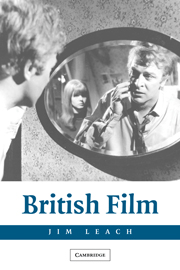Book contents
- Frontmatter
- Contents
- Acknowledgments
- Introduction
- 1 The National Health: Great Britain/Deep England
- 2 The Magic Box: What Is British Cinema?
- 3 The Common Touch: The Art of Being Realistic
- 4 The Mirror Crack'd: British Expressionism
- 5 Millions like Us: National Cinema as Popular Cinema
- 6 The Stars Look Down: Acting British
- 7 No Sex Please – We're British: Sex, Gender, and the National Character
- 8 Carry On Regardless: The British Sense of Humor
- 9 Sexy Beasts: British Monsters
- 10 The Ruling Class: Ideology and the School Movie
- 11 The Long Memory: History and Heritage
- 12 I'm British but … : Empire and After
- Notes
- Bibliography
- Filmography
- Index
1 - The National Health: Great Britain/Deep England
Published online by Cambridge University Press: 07 May 2010
- Frontmatter
- Contents
- Acknowledgments
- Introduction
- 1 The National Health: Great Britain/Deep England
- 2 The Magic Box: What Is British Cinema?
- 3 The Common Touch: The Art of Being Realistic
- 4 The Mirror Crack'd: British Expressionism
- 5 Millions like Us: National Cinema as Popular Cinema
- 6 The Stars Look Down: Acting British
- 7 No Sex Please – We're British: Sex, Gender, and the National Character
- 8 Carry On Regardless: The British Sense of Humor
- 9 Sexy Beasts: British Monsters
- 10 The Ruling Class: Ideology and the School Movie
- 11 The Long Memory: History and Heritage
- 12 I'm British but … : Empire and After
- Notes
- Bibliography
- Filmography
- Index
Summary
The idea of studying a national cinema depends on the claim that there is a significant relationship between films and the cultural traditions of the nation-state within which they are made. There are numerous obstacles that make it difficult to define this relationship, not the least being the need to determine what exactly a “nation” is. In the influential definition proposed by Benedict Anderson, a nation is “an imagined political community.” This formula captures the tension between two interlinked ways of thinking of the nation: as an imaginary structure of myths and traditions that provides a sense of collective identity, and as a political institution.
In an ideal situation, these two senses of the nation will reinforce each other, but both are subject to historical pressures that can pull them apart. These pressures are, to some degree, inherent in the attempt to establish a sense of common, national interests among people whose social status and regional backgrounds are quite different. The experience of national identity has recently been complicated by the emergence of new communities larger than the nation-state (the European Union, for example) and by the disintegration of many established nations into smaller nations on the basis of religious or ethnic differences.
In his analysis of the “new world order,” Timothy Luke points out that the “modern nation-state” dates back only to the seventeenth century and suggests that it “proved even in the ideal type models of England and France, to be very limited, fictive and artificial.”
- Type
- Chapter
- Information
- British Film , pp. 13 - 29Publisher: Cambridge University PressPrint publication year: 2004



